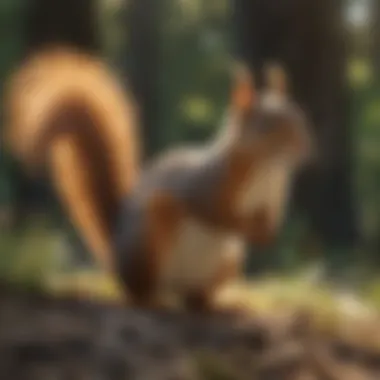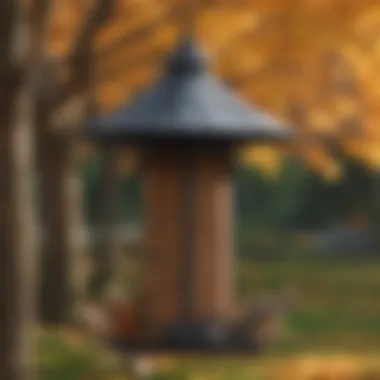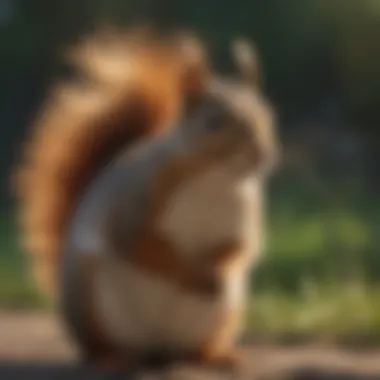Effective Strategies to Keep Squirrels Away from Your Home


Preventive Pest Control Strategies
When it comes to deterring squirrels from invading your home, implementing effective preventive pest control strategies is essential. Starting with the exterior of your house, it's important to seal any cracks or openings that can serve as entry points for squirrels. Regularly inspecting and clearing debris from your yard is crucial in maintaining a pest-free environment. Additionally, taking proactive steps to prevent pests from entering your property through various access points is key to squirrel deterrence.
Proper yard maintenance plays a significant role in keeping squirrels at bay. Establishing essential yard care routines such as mowing the lawn regularly, trimming overgrown bushes, and removing any potential hiding spots can discourage squirrel activity. Furthermore, employing methods to keep your yard pest-free, such as using natural repellents or creating barriers, can enhance the effectiveness of your squirrel deterrence efforts.
Maintaining indoor cleanliness is equally important. Expert cleaning tips and techniques like vacuuming regularly, sealing food containers, and properly disposing of trash can help create a pest-resistant indoor environment, making it less appealing to squirrels. Proper garbage disposal is also essential in deterring pests. Adopting efficient waste disposal methods and understanding the importance of proper garbage handling can prevent squirrel infestations in and around your home.
To supplement these preventive measures, exploring innovative ways to safeguard your home against pests can provide an additional layer of protection. Implementing techniques such as using ultrasonic devices, installing motion-activated sprinklers, or utilizing natural deterrents like predator urine can help ward off squirrels effectively.
Stay tuned for the next section on identifying pest risk areas, where we delve into moisture prone areas inspection, crack and crevice inspection guide, greenery inspection for pest risks, and more for comprehensive squirrel deterrence.
Understanding Squirrel Behavior
Understanding squirrel behavior is crucial in effectively deterring these pesky creatures from infiltrating your home. By delving into the habits and patterns of squirrels, homeowners can identify potential vulnerabilities and take proactive measures to safeguard their properties. This section will explore key elements such as squirrel routines, preferred habitats, and behaviors that attract them to residential areas.
Squirrel Habits and Patterns
Daily activities of squirrels
Squirrels are known for their constant movement and foraging behavior, engaging in activities like searching for food, building nests, and protecting their territories. Their agile nature and scavenging habits make them adept at exploiting human environments for sustenance and shelter. Understanding these daily routines is essential for implementing effective deterrence strategies.
Factors attracting squirrels to houses


Squirrels are attracted to houses due to factors such as easy access to food sources, comfortable nesting opportunities, and shelter from predators. Human habitation provides an ideal environment for these creatures to thrive, leading to frequent incursions into residential spaces. Recognizing the allure of homes to squirrels helps homeowners fortify their defenses against potential infestations.
Signs of Squirrel Infestation
Indications of squirrel presence indoors
Indications of squirrel presence indoors include sounds of scampering in the attic, chewed electrical wires, and droppings in secluded areas. Detecting these signs early is crucial to prevent extensive damage and health hazards caused by squirrel infestations. Homeowners need to be vigilant and act promptly upon noticing such indicators of squirrel activity.
Damage caused by squirrels
Squirrels can cause various forms of damage to a home, including gnawed furniture, torn insulation, and contaminated supplies. Their constant chewing behavior poses a threat to property structures and poses a fire hazard due to damaged wiring. Understanding the extent of potential damage highlights the urgency of implementing effective squirrel deterrent methods.
Preventive Measures
Preventive measures play a crucial role in effectively deterring squirrels from your house. By implementing these strategies, you can safeguard your property and create a squirrel-free environment. These measures are designed to address specific aspects of squirrel behavior and habits, ensuring long-term protection for your home.
Securing Entry Points
When it comes to securing entry points, one essential aspect is sealing gaps and holes. This process involves identifying and closing off any potential entry points that squirrels might exploit to gain access to your house. Sealing these openings helps prevent squirrel infestations and reduces the risk of property damage. While sealing gaps and holes may require a thorough inspection and some minor repairs, the benefits of keeping squirrels out far outweigh the time and effort involved.
Another effective method is installing mesh or barriers to block squirrels from entering your home. These physical barriers act as a deterrent, limiting access to vulnerable areas and protecting your property. Mesh or barriers are a popular choice among homeowners due to their durability and long-lasting effectiveness. However, it's essential to select the right type of material and ensure proper installation to maximize their effectiveness.
Trimming Trees and Vegetation


Maintaining a clear perimeter around your house is another key preventive measure to deter squirrels. By trimming trees and vegetation near your property, you reduce the chances of squirrels gaining easy access to your roof or attic. This practice also enhances the overall aesthetic appeal of your home while mitigating potential squirrel-related risks. While maintaining a clear perimeter requires regular upkeep, the benefits of a well-trimmed landscape extend beyond squirrel prevention.
Pruning overhanging branches is a specific practice that complements maintaining a clear perimeter. By removing branches that provide easy access to your house, you eliminate potential pathways for squirrels to enter your property. This proactive approach not only deters squirrels but also promotes the healthy growth of trees and shrubs. Considering the visual and practical benefits, pruning overhanging branches is a valuable addition to your squirrel deterrence efforts.
Proper Food Storage
Storing birdseed and pet food securely is a vital aspect of preventing squirrel infestations. These food sources are attractive to squirrels and can lure them to your property. By storing birdseed and pet food in airtight containers or secure storage areas, you minimize the likelihood of attracting squirrels. This simple yet effective preventive measure helps mitigate the risk of squirrel-related nuisances and maintains a tidy living environment.
Using squirrel-proof containers is another practical approach to safeguarding your stored food items. These specialized containers are designed to be squirrel-resistant, preventing curious critters from accessing the contents. Opting for squirrel-proof containers not only protects your stored food but also ensures the cleanliness and organization of your storage areas. While investing in these containers may incur initial costs, the long-term benefits in terms of squirrel deterrence make them a worthwhile investment.
Eliminating Attractants
Removing fallen fruits and nuts from your property is crucial in deterring squirrels. These natural food sources attract squirrels and encourage them to frequent your outdoor spaces. By promptly cleaning up fallen fruits and nuts, you reduce the incentive for squirrels to visit your property, diminishing the likelihood of infestations. This simple yet effective measure contributes significantly to maintaining a squirrel-free environment and preserving the cleanliness of your yard.
Keeping trash bins tightly closed also plays a vital role in eliminating attractants for squirrels. Food waste and debris can entice squirrels to rummage through your trash, creating messes and attracting unwanted wildlife. By securely closing trash bin lids and properly managing waste disposal, you minimize opportunities for squirrels to forage near your home. This preventive measure not only reduces the risk of squirrel encounters but also promotes hygienic practices and a clean outdoor environment.
Repellent Techniques
Repellent Techniques play a crucial role in the comprehensive guide to deterring squirrels from your house as they offer effective ways to discourage these critters from invading your property. One of the key benefits of incorporating repellent techniques is their non-harmful nature to both the squirrels and the environment while effectively creating a deterrent barrier. When considering repellent techniques, it is essential to weigh the effectiveness, sustainability, and safety aspects to ensure optimal squirrel deterrence.
Natural Repellents
Use of predator urine


The utilization of predator urine is a significant component of natural repellents that serve as an effective deterrent against squirrel invasions. Predator urine mimics the presence of natural predators in the area, triggering fear responses among squirrels and deterring them from venturing near your home. The key characteristic of predator urine lies in its ability to exploit the innate instinct of squirrels to avoid potential predators, making it a popular choice for natural squirrel deterrent solutions. One unique feature of predator urine is its organic and eco-friendly composition, ensuring that it does not pose any harm to the environment. While predator urine offers benefits in effectively deterring squirrels, its main disadvantage may be the need for replenishment over time to maintain its potency in repelling squirrels efficiently.
Spraying with spicy repellent
Another effective natural repellent method involves the application of spicy repellents that utilize strong scents to discourage squirrels from entering your property. By spraying areas vulnerable to squirrel activity with spicy repellents, you create a hostile environment that these critters find unappealing, prompting them to seek alternative locations. The key characteristic of spicy repellents lies in their potent aroma, which masks any attractive scents and signals danger to squirrels. This makes them a popular choice for homeowners seeking a non-invasive approach to squirrel deterrence. A unique feature of spicy repellents is their versatility in repelling various pests apart from squirrels, offering broader pest control benefits. However, one disadvantage of relying solely on spicy repellents may be the need for frequent reapplications, especially after rainfall or exposure to outdoor elements.
Electronic Repellent Devices
Ultrasonic sound devices
Ultrasonic sound devices represent a modern approach to squirrel deterrence, emitting high-frequency sounds that are disruptive to squirrels' sensitive hearing. The key characteristic of ultrasonic sound devices lies in their silent operation, making them an inconspicuous yet potent tool in warding off squirrels. This feature contributes to their popularity among homeowners looking for discreet and effective methods to deter squirrels. The unique advantage of ultrasonic sound devices is their ability to target specific areas without causing disturbance to humans or pets, ensuring precise squirrel deterrence. However, a potential disadvantage of ultrasonic sound devices is the adaptation capability of squirrels over time, necessitating occasional repositioning or alternating frequencies to maintain their effectiveness.
Motion-activated sprinklers
Motion-activated sprinklers provide a physical deterrent by detecting squirrel movement and triggering a sudden burst of water, startling the intruding squirrels and prompting them to retreat. The key characteristic of motion-activated sprinklers lies in their immediate response to squirrel activity, delivering a swift and non-harmful deterrent to discourage squirrels effectively. This feature makes them a popular choice among homeowners seeking a humane yet efficient way to protect their property from squirrel infestations. The unique benefit of motion-activated sprinklers is their dual functionality in not only deterring squirrels but also nurturing garden areas by providing periodic irrigation. However, a possible disadvantage of motion-activated sprinklers may be their reliance on water supply and occasional adjustments to prevent false activations.
Professional Assistance
In the realm of deterring squirrels from infiltrating your living spaces, seeking professional assistance plays a pivotal role. The complexities of wildlife control mandate the expertise and precision offered by trained professionals. Bringing in specialists to handle squirrel-related issues can significantly enhance the efficiency and effectiveness of your pest management strategies. Their in-depth knowledge of squirrel behavior, along with advanced techniques and tools, can ensure a more thorough and lasting solution to the problem. Moreover, by entrusting the task to professionals, you can alleviate the stress and uncertainties often associated with DIY approaches, allowing you to focus on other aspects of maintaining your home.
Hiring Wildlife Control Services
When it comes to addressing squirrel infestations, hiring wildlife control services emerges as a crucial step in the process. These services typically offer a range of specialized solutions tailored to combat squirrels' intrusion effectively. Starting with Assessment and trapping services, this aspect involves thorough investigations of your property to identify squirrel entry points and nesting areas. By conducting comprehensive assessments, wildlife control experts can devise strategic trapping plans to capture and relocate squirrels in a humane manner. This approach not only eliminates current infestations but also prevents future reoccurrences, making it a sustainable strategy for safeguarding your home.
On the other hand, Exclusion techniques focus on fortifying your property against potential squirrel invasions. These techniques involve sealing off entry points, such as gaps and holes, using durable materials to prevent squirrels from re-entering. While exclusion techniques require precision and expertise, they offer long-term benefits by creating a fortified barrier against squirrel intrusions. Although this approach may involve initial investments, the lasting protection it provides outweighs the costs in the long run.
Consulting Pest Control Experts
Collaborating with pest control experts is instrumental in developing long-term prevention plans to deter squirrels effectively. Integrated pest management solutions offered by these experts emphasize a holistic approach to pest control, integrating preventive measures with environmentally friendly practices. By utilizing a combination of techniques such as habitat modification, biological control, and targeted treatments, integrated pest management solutions aim to minimize the reliance on chemical pesticides while maximizing efficiency in squirrel prevention.
Furthermore, Long-term prevention plans devised by pest control experts focus on creating sustainable strategies to mitigate squirrel infestations over extended periods. These plans often include regular inspections, maintenance of deterrent devices, and ongoing support to address emerging threats proactively. By engaging with pest control experts, homeowners can secure tailored prevention plans that align with their specific needs and preferences. This collaborative effort ensures a comprehensive and enduring solution to squirrel-related challenges.



